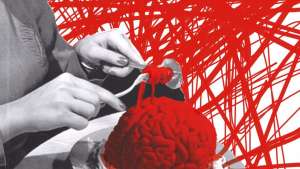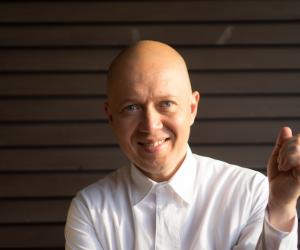From the Series
There are two things that tech entrepreneur Marko Ahtisaari is trying to do with the music we love. The first is to get us to use music as a healthcare solution as we would a drug. The second is to make sure that musicians get paid.
In the first, called The Sync Project, Ahtisaari taps into your intuitive ability to decide which music will enhance an activity. "We understand the power that music has over us. It affects our brain, our emotions and our bodies. We all self-medicate with music. We use music to get pumped up, to go to the gym. We use music to de-stress and unwind. We also use music to get in the zone, to concentrate. So intuitively we know that it's working."
Thanks to recent research in the field of neuroscience, we know that music fires off the same signals that we’d otherwise receive from a drug like a prescribed psychostimulant. It’s because of its effect on the human body that Ahtisaari believes music can be used as therapy, providing a drug-free treatment alternative that is tailored to the user’s needs.
The Sync Project uses the internet to gather data. It then applies machine learning to this dataset to develop personalised music therapeutics. As part of the project, Ahtisaari introduced the 2017 Design Indaba Conference audience to Unwind, a global experiment using music designed to improve relaxation before sleep.
Ahtisaari hopes to use music to treat stress-related problems, poor sleep patterns and over the longer term, pain. This, he says, would reduce our exposure to the dangers and side effects of pharmacological programmes.
Using an unrelated dataset, Ahtisaari, also a director’s fellow at MIT, launched The Open Music Initiative in collaboration with MIT Media Lab. Speaking after the Conference, Ahtisaari explained that streaming services like Soundcloud and Spotify run into problems when they’re trying to pay artists because they don’t know who to pay.
The project seeks to explore how cryptocurrency systems like Bitcoin could make this payment process easier by enabling open, decentralised data platforms.
“We think that a distributed system, in the form of a digital ledger of music contracts, might be the answer to this particular problem. We can design a common format and an open platform for licensing data. In a distributed system, many entities can work together to maintain an open, transparent database that everyone runs, but no one owns,” explains MIT Media Lab.
“This technology is not a panacea for all the problems afflicting the music industry. It’s going to be a long, hard road to bring together stakeholders and design a solution that the entire industry can get behind.”
Created by you. Inspired by Design Indaba. This series is brought to you by Liberty.
Create. Share. Inspire.












